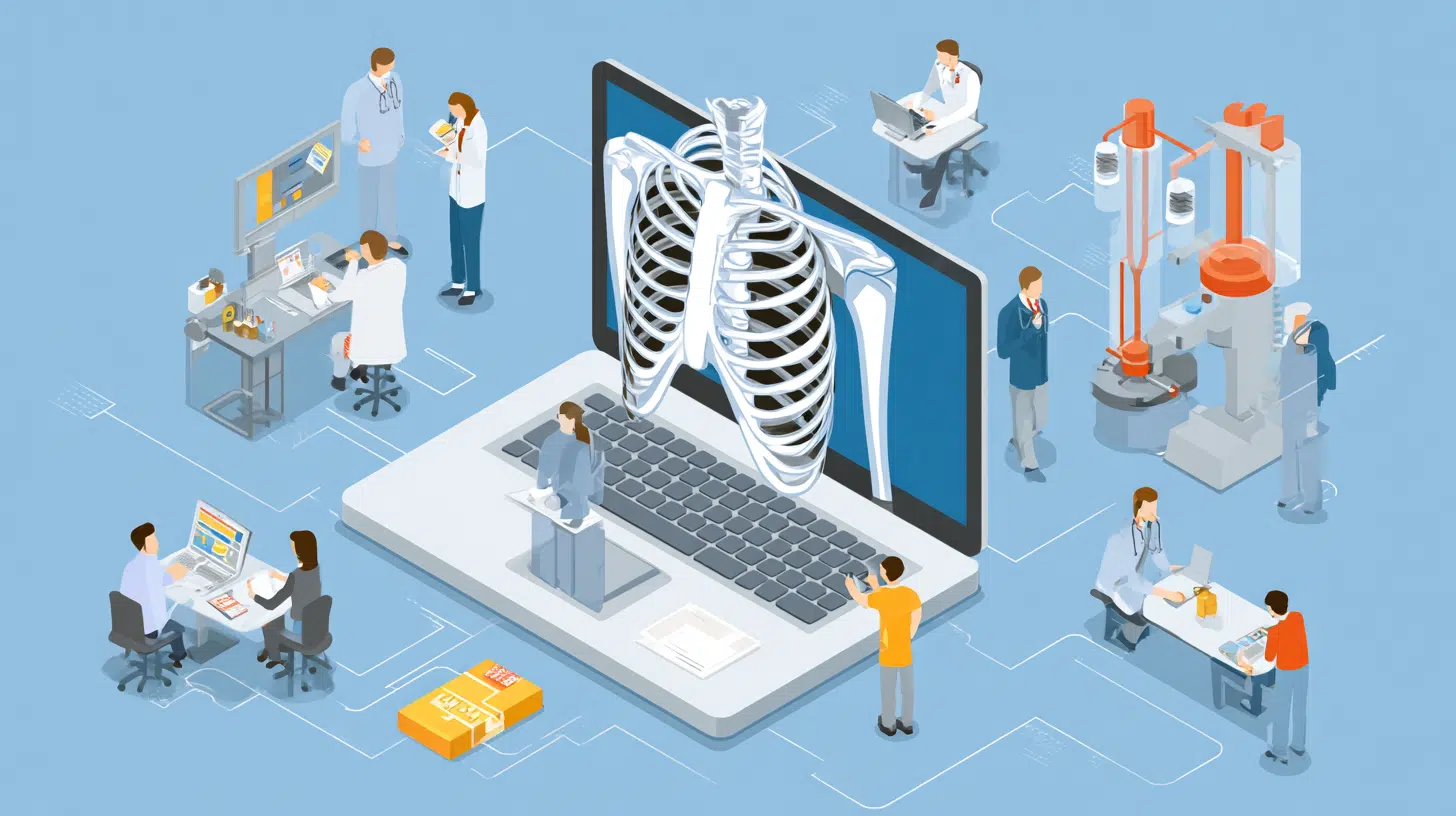If you are among those considering a career in radiologic technology, the convenience and accessibility of online learning can open new doors.
Honestly, getting your radiology certification online has become as easy as clicking buttons on your smartphone.
Online radiologic technology programs offer flexibility while maintaining quality education standards.
From LMRT certification to bachelor’s degrees for current technologists, here’s a detailed guide to the leading online radiology programs, their formats, and the facts to be in the reality of what this path holds for you.
Insights on Radiology and LMRT Certification
A radiologic technologist is a healthcare professional trained to perform medical imaging procedures such as X-rays, CT scans, and MRIs.
They play a vital role in patient diagnostics, working alongside physicians to capture high-quality images safely and compassionately.
The LMRT (Limited Medical Radiologic Technologist) certification qualifies individuals to perform a more restricted range of imaging procedures, typically limited to specific types of X-rays or body parts.
A full-scope technologist, on the other hand, holds broader credentials and can perform more advanced imaging across multiple modalities.
Requirements for LMRT often include a focused certificate program and successful completion of state or ARRT exams.
Types of Online Radiology Programs Available

-
Online Associate Degrees in Radiologic Technology: These are the Entry-level programs designed for those new to the field.
These generally include online coursework in anatomy, patient care, and basic imaging techniques, paired with scheduled clinical rotations at affiliated medical centers. -
Online Bachelor’s Degrees (BSRT) for Current RTs: Completion programs for registered technologists seeking to expand credentials.
These provide advanced imaging, leadership, and healthcare systems training, delivered primarily online for working professionals. -
Certificate Programs for Career Changers or LMRT Upgrades: Short-duration courses focused on limited radiography or specialized modalities.
Ideal for expanding scope (e.g., from LMRT to full technologist) or specializing in areas like CT or MRI. -
Hybrid Formats: Programs combine online/distance instruction for didactic components with scheduled in-person labs and clinicals.
The blend allows for remote learning while ensuring essential practical skills are developed under supervision.
Top Accredited Institutions Offering Online Radiology Certification
Here are 11 leading colleges and schools with top online or hybrid radiologic technology programs:
1. Midwest State University (Texas)
Midwest State University provides an online Bachelor of Science in Radiologic Sciences tailored for working professionals who are already credentialed technologists.
The program is flexible with asynchronous coursework and is regionally accredited, designed to help technologists advance into administrative or advanced clinical roles.
Fees: Varies by state residency; contact the admissions office for current details.
Duration: Typically 2 years for full-time degree completion (assuming prior associate degree/registry).
To Apply: Click Here
2. University of Wisconsin – Oshkosh
The University of Oshkosh offers a fully online degree completion program ideal for technologists seeking career progression with a bachelor’s credential.
The program is JRCERT-accredited and offers strong student support plus networking opportunities.
Fees: Tuition rates depend on residency and program specifics; request info for up-to-date costs.
Duration: 2 years (full-time); part-time schedules available, extending total duration.
To Apply: Click Here
3. University of Cincinnati
This university’s comprehensive online BSRT program is designed for ARRT-registered technologists looking to move into advanced clinical practice or management.
The curriculum emphasizes leadership and healthcare systems knowledge.
Fees: Tuition varies by residency, with discounts for in-state students; consult admissions for current rates.
Duration: Minimum 2 years for degree completion with full-time enrollment.
To Apply: Click Here
4. Cox College
Cox College offers both associate and bachelor’s options, blending online coursework with clinicals arranged at local partner sites.
The bachelor’s pathway is intended for technologists seeking broad skills and professional development.
Fees: Typically ~$10,000–$14,000 per year, depending on degree and individual course load.
Duration: Associate: 2 years; Bachelor’s completion: 1.5–2 years (for credentialed RTs).
To Apply: Click Here
5. Boise State University
The online bachelor’s completion at Boise State serves ARRT-credentialed technologists, focusing on leadership, healthcare systems, and new imaging technologies.
The program is flexible with several entry terms per year.
Fees: Tuition averages about $350–$370 per credit hour for online undergraduates.
Duration: Typically 2 years for degree completion; self-paced for working professionals.
To Apply: Click Here
6. Augusta University
Augusta’s online BS completion program in radiologic sciences is designed for those already credentialed, supporting advancement in management or specialties like CT and MRI.
The program allows for concurrent clinical employment.
Fees: Tuition is around $340–$370 per credit hour for distance learners.
Duration: Around 2 years, depending on transfer credits and full/part-time status.
To Apply: Click Here
7. Washburn University
Washburn offers an accredited online BSRT with flexible start dates and personal advising, oriented towards working professionals who want to expand into advanced modalities or management.
Fees: Tuition for online students is approximately $333 per credit hour.
Duration: 2 years for bachelor’s completion if enrolled full-time.
To Apply: Click Here
8. University of Louisiana, Monroe
ULM features a 100% online BSRT degree completion program, tailored for those with an associate degree or hospital-based RT certificate. The self-paced structure is ideal for balancing work and study.
Fees: Around $400 per credit hour, with programs typically spanning two years.
Duration: Usually 2 years for full-time students.
To Apply: Click Here
9. University of New Mexico
UNM provides a fully online BS in Radiologic Science completion track, designed for flexibility whether studying full- or part-time. It’s accessible to technologists seeking career or credential upgrades.
Fees: Approximately $264.20 per credit hour for online students.
Duration: 18 months to 2 years (depending on course load and credit transfer).
To Apply: Click Here
10. Lewis-Clark State College (Idaho)
Lewis-Clark is known for its affordability and strong preparation for the ARRT exam, offering a flexible online presence for Idaho residents and beyond.
Fees: About $6,982 per year for in-state students.
Duration: 2 years for bachelor’s degree completion, based on prior credits.
To Apply: Click Here
Tips on Accreditation
Look for JRCERT (Joint Review Committee on Education in Radiologic Technology) and ARRT (American Registry of Radiologic Technologists) accreditation for assurance of curriculum and clinical quality.
This helps ensure eligibility for license exams and professional practice nationwide.
Special Program Highlights
Several programs offer advanced imaging concentrations, leadership tracks, and flexible clinical placements to support both entry-level learners and career climbers.
What Does Online Coursework and Clinical Training Cover?

Online curricula commonly include:
-
Patient Care: Science of interacting with and safeguarding patients in medical imaging environments.
-
Anatomy & Physiology: Understanding human structure to ensure high-quality imaging and patient safety.
-
Imaging Procedures: Technical skills for X-rays and cross-sectional modalities.
-
Radiation Safety: Best practices to protect patients and professionals.
Online delivery might use interactive lectures, video demonstrations, digital lab simulations, and asynchronous assessments.
For clinical training, programs coordinate local hospital or clinic externships, so students get supervised hands-on practice essential for certification.
Additional topics may include ethics, medical law, sectional anatomy, image evaluation, and advanced imaging modalities, depending on program level.
Pros and Cons of Online Radiology Education

We know there are always two sides to a coin. Here’s a complete table of the Pros and Cons of pursuing Radiology education via online mode.
| Criteria | Pros | Cons |
|---|---|---|
| Flexibility | Study on your schedule; ideal for working adults | Requires strong self-discipline and time management |
| Clinical Placement | Local externships reduce travel | Coordination with local sites can be competitive or stressful |
| Cost/Financial Aid | Often lower program fees; financial aid available | Limited scholarships compared with on-campus programs |
| Technology/Access | 24/7 access to coursework and digital resources | Reliable internet, updated devices required; may incur extra costs |
| Instructor Support | Direct digital access to faculty, recorded content | Less face-to-face mentorship and peer networking |
| Curriculum Breadth | Includes leadership/advanced imaging options | Some specialties require more on-site equipment or practice |
| Hands-On Learning | Hybrid/blended labs offered in some programs | 100% online programs may lack immediate, supervised feedback |
To Conclude It!
Earning a radiology certification or degree online gives you the power to shape your career around your life.
Depends on you , if you are starting fresh with an associate degree, upgrading LMRT credentials, or reaching higher with a bachelor’s, the accredited online options presented here today, deliver a solid, flexible pathway.
With careful selection of programs and the commitment & discipline to hands-on clinical training, you will be ready for a vibrant, evolving field with strong job prospects and room to grow.
Frequently Asked Questions
Is Online Radiology Learning as Popular as Campus-Based?
Yes, if accredited and paired with proper clinicals, employers and licensing boards accept these programs.
Can I Become a Rad Tech without On-Campus Attendance?
Most programs still require clinical rotations, but classwork can be online.
How do I Know a Program is Reputable?
Check for JRCERT or ARRT accreditation and strong graduate pass rates.
Is LMRT Certification a Full Substitute for RT?
No; LMRT is a limited-scope credential, usually state-specific and more restricted than full RT licensing.
Can Online Programs Help with Career Advancement?
Absolutely, many bachelor’s and advanced certificate programs serve working RTs aiming for leadership or specialization.












